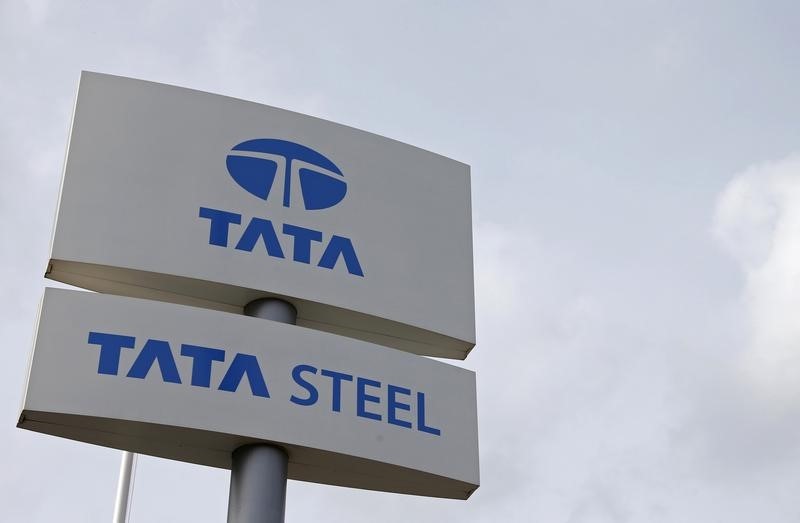By Andy Bruce and Kate Holton
PORT TALBOT, Wales/LONDON (Reuters) - Britain battled to save its steel industry on Wednesday after India's Tata Steel (NS:TISC) put its British operations up for sale, leaving thousands of jobs at risk as a result of cheap Chinese imports.
The move comes less than three months before Britons vote on the country's membership of the European Union in a referendum dominated by concerns about the economy.
The government said it was working to broker a deal with potential buyers after Tata Steel sought to end its almost decade-long venture in Britain, which employs 15,000 people but has been hit by high costs and Chinese competition.
"This is my fourth time that I've been placed under the threat of redundancy," 51-year-old steelworker and union representative Mark Turner said outside Tata's plant in Port Talbot in Wales, Britain's biggest steel works.
"If this shuts, there is nowhere else to go."
The move could have an impact on Britain's closely fought June 23 vote over whether to stay in the EU.
Britain's eurosceptic media have blamed Brussels for preventing London from taking greater steps to protect the industry and one of the campaign groups hoping to lead Britain out of the EU said it was "killing our steel".
But supporters of EU membership said the bloc was not responsible for the industry's plight and that the EU was a big buyer of British steel.
Britain's business minister Sajid Javid said he was seeking investors to take over the assets.
"There are buyers out there," he said as he cut short a trade trip to Australia to return to Britain. "It might require some kind of government support and we are more than ready to look at all ways that we can provide commercial support."
Javid rejected a call from the opposition Labour party for the government to take a stake in the industry.
Labour leader Jeremy Corbyn traveled to Port Talbot to criticize the government for not responding more strongly to the surge in imports from China.
"It seems to me that too many people are not prepared to say to the Chinese government: sorry, your behavior is not right, not fair, not proper and certainly not within the rules of the World Trade Organization," he said.
Steelmakers in Britain pay some of the highest energy costs and green taxes in the world, which, along with cheap Chinese steel imports, mean it could be hard to find a buyer.
Analysts said Tata would likely struggle to find a buyer for the entire UK division but could try to sell it in parts.
The sale ramps up pressure on Prime Minister David Cameron's right-leaning Conservative government, which has sought to cultivate closer ties with China.
His fate already hangs in the balance over Britain's future in the EU, and his government, which is campaigning for Britain to stay in the bloc, has sought to avoid controversies during the run-up to the vote.
However the Conservatives are still resented in Britain's industrial heartlands for the demise of mining and manufacturing under former prime minister Margaret Thatcher in the 1980s.
A vital part of the economy through the 19th and 20th centuries, many of Britain's former steel towns have been decimated by the industry's decline since its peak in the 1970s.
The Port Talbot plant, which dominates the small coastal town with its giant furnaces, still employs about 4,000 people, and Tata is one of the biggest private companies in Wales.
COLLAPSING STEEL
Tata Steel's problems in Britain arose almost as soon as it bought Anglo-Dutch steelmaker Corus in 2007. Industry bankers said Tata overpaid for Corus at the peak of the market. Despite heavy investment, Tata Steel struggled to compete.
Cameron's government has said it is taking measures to help the steel sector but the fundamental problem remains the collapse in the price of steel, caused by overcapacity in China.
Britain imported 826,000 tonnes of Chinese steel in 2015, up from 361,000 two years earlier, according to the International Steel Statistic bureau. EU diplomats say that Britain tends to vote against anti-dumping duties due to its free trade approach.
Tata Steel is the second-largest steel producer in Europe. It has a crude steel production capacity of over 18 million tonnes per annum in Europe, but only 14 million is operational.
Two of its three main European units, Port Talbot and Scunthorpe, are in Britain, with the rest in the Netherlands.
Its share price has halved in the past five years over which it wrote down the value of its UK assets by $2.9 billion.
News of the sale prompted talk amongst industry analysts and bankers of a wider consolidation of the European steel sector.
Tata said it was still in talks with investment firm Greybull Capital over the sale of its British long products unit at Scunthorpe. A source close to Greybull said it was unlikely to be interested in the new assets coming to market however.
